| Every year for the past several years I have taken a
prospecting trip to Sierra City, California to dredge on a friend's claim nearby.
Sierra City is a historic gold rush town of a little more than 200 persons.
Known mostly for its rich lode mines, it also had some rich placers as well. Its now a
center for various recreational activities including prospecting, fishing, etc. Last's
years trip didn't go very smoothly for me, as mechanical problems with the pump caused me
to get only about a day and a half of dredging in for a five day trip. Still, I did pretty
good for the time spent, and I got about a penny weight of gold. For 2003, I wanted
to add a few days to get back the ones I lost in 2002, and I wanted to make a few
improvements to the dredge. A few years ago I added a new pump, and I noticed a
decrease in
fine gold recovery at the same time. The increased flow volume was blowing gold
right out my sluice box. I was determined to make improvements for 2003, so I built a new
sluice to replace the old crash box style unit I originally purchased from Keene in 1978.
I am a Mining Engineer by training, so the project did not seem unreasonable to me. |
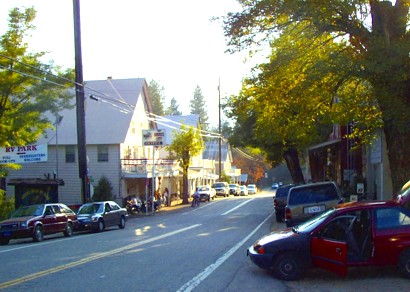 |
|
|
The
historic old mining town of Sierra City |
| For those who are interested in seeing more on the design and
construction of my home made 3 stage sluice, click here:
HOME MADE SLUICE BOX. The first day, all I really did was make
the drive up from Reno, get my camp trailer situated, and move the dredge down the trail
to the river. I got going setting up the dredge the next morning. This was the first
time I had set up the modified dredge in the water, so it took until noon to get it set
up. By afternoon though, I was in the water and moving gravel and the the dredge seemed to
operating just fine. The first clean up confirmed that I was getting much better fines
recovery. I worked an area with fairly good gold. The gold was coming in on the
bottom of a flood layer, and there was a visible color change at that point. There
was very little gold actually in the lower layer, so once I hit the lower layer, I just
moved over to the adjacent area. The barren flood layer was covered by one to two feet of
clean recent gravel. Bedrock was much farther down, though I never got close to it
to see exactly how far. The deepest I went was the first week was about 3 feet. Previously
I had gone to about 5 feet, but had not found bedrock. The second week I punched down to 5
feet again in another place, with still no bedrock. |
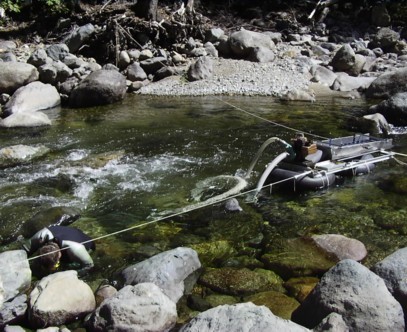 |
|
|
The
modified Dredge in the N. Fork, Yuba River |
| The third day I went out to do a little detecting. I went
with another prospector to a site that had been ground sluiced by the old time
prospectors. There were several acres where the bedrock was fairly flat and close to or
exposed at the surface. There were also many acres covered with stacked boulders. The area
had a large amount of iron, as nails, scraps of sheet metal or bits of can. Iron
discrimination was definitely needed. Unfortunately, my detector was not operating properly,
as I had accidentally broken off a switch on my MXT before I left for this trip. This meant
that I was locked at a certain ground balance setting, and the machine would not adjust
(which the MXT normally does automatically). Still I covered a lot of ground, and though I
did not find any gold here, I did find some small bits of lead, so I figure if I had put
the coil over any gold, I would have found it. The guy I was with did find a few flakes
panning surface material, but did not find anything with his detector, either. He had
previously found nuggets to 5 dwt detecting at this site, but I think its pretty well
cleaned out, now. He was using a Fisher Gold Bug II. That afternoon, I did get in a couple
hours dredging, and did much better at finding gold with the dredge. |
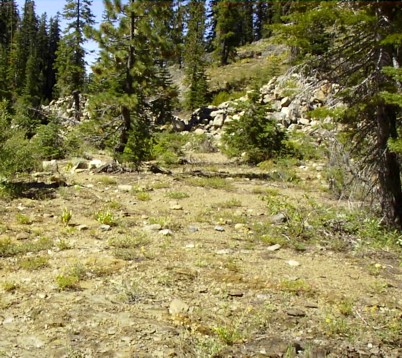 |
|
Ground
sluicing site - Bedrock in Foreground |
|
| Last year, I had scoped out an area
among some boulders that I wanted to work with the dredge. Because I was only going down
about a foot and a half to a flood layer change, I had pretty much worked that area
out by the end of the first Saturday. I just ran into too many large boulders, and though
I was getting some gold, it wasn't enough to justify stringing up a come along. So, I just
proceeded to move over to an adjoining area. There were adjoining areas of a similar
nature a few feet away, so I moved over and kept working. My schedule was to make this
prospecting trip out of two consecutive long weekends. I arrived on a Wednesday, and I
would return home that Sunday afternoon, take care of work and the home front for several
days, and then return on the following Thursday. Sierra City is only 2 hours from my home,
so this schedule allowed me to get 9 days of prospecting, while only taking 5 days of
vacation - and most of all keep the wife happy. I was pleased with how things worked
out as far as the two week schedule. |
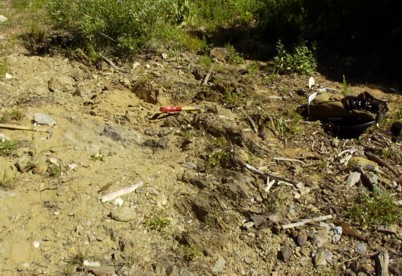 |
|
|
Chasing
detector targets in exposed bedrock |
| Well, when I returned for the second half of the trip, we had
weather problems. It rained before I arrived, but it started pouring down very heavy rain
with frequent lightening about an hour after I got there. I hadn’t yet finished
assembling the dredge, so I covered the motor went back to the house above the area we
work, and waited under the eves for the rain to let up. After a while it let up – but
we got almost an inch in about 20 minutes. I got the dredge running, but after about 45
minutes of operation the water got so murky from the run off that I couldn’t see more
than about a foot, and I had to stop dredging. It continued to rain heavily with frequent
lightening off and on for over 24 hours, and the river remained too murky to dredge. Early
Friday afternoon, I decided to try a little sniping along the river with my pan, but the
rains returned and I got drenched. It was cold, with a high of about 60 when it should
have been in the low to mid 90s. |
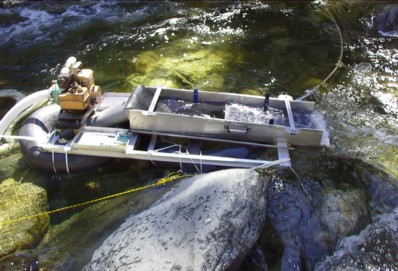 |
|
The
dredge and new sluice box in action |
| At about 3 pm on Friday it finally let up, but the water
wasn’t clear enough to dredge until Saturday morning, and I had arrived on Thursday!
While I was waiting out the rain, I spent some time looking at old reports, maps, etc and
making plans for future trips. I had brought these to look at in the evenings, but I had
lots more free time with the bad weather. I also spent some time talking with some of the
other prospectors working in that area, and I heard a tale that we are going to chase down
real soon. It’s a small tributary creek high in the gold country and we have a
reliable report that it gives 2 to 3 rice to pea sized nuggets in every pan, without being
too picky about where the pans are taken from (yah, I know these tales are usually
exaggerated, but I need to see if its true). It’s a far hike from the nearest road to
the site, so we’ll make plans and do it soon. At the end of the day on Friday, (after
the rain let up, but the river was still too muddy) I spent a couple hours detecting with
my metal detector along the exposed bedrock by the river. It has been well worked before,
but I did manage a small 2.1 gain nugget out of a previously worked crevice. Sometimes
folks think they have finished getting every little thing out of a spot, but the metal
detector can let you know otherwise. The gold often hides right at the very bottom of the
crevice. |
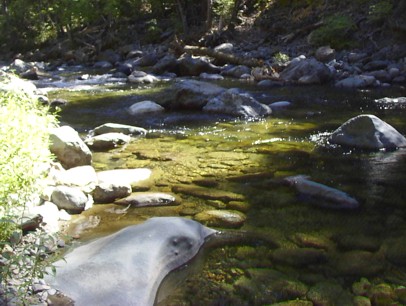 |
|
|
Next
Year's planned 2004 Dredge site |
|
By Saturday morning the weather was great and the river had
cleared up, so into the water I went. The dredge had gotten all kinds of heavy dew
condensate inside it, so it was a little hard to start the motor, but I got in about 5
hours of dredge time. I continued to work the shallow flood layer that appears in that
part of the river, which I had been working the week before. I also took a little time to
make a few plans for where I will dredge next year. I take photos of the river to help me
remember. Of course if we get a big flood, it will all be moved around and I’ll have
to start from scratch. One of my co-workers came up from Reno on Saturday to do a little
panning, and after I was done, we went and got a burger at the local coffee shop.
Sunday was my last day, so I only got in about 1.5 hours of dredge time before I had to
quit. It took about 3 hours to clean the sluice box and pan it down, disassemble the
dredge and carry the parts up the hill to my car. I got my trailer from the campground and
had a nice, uneventful trip home. |
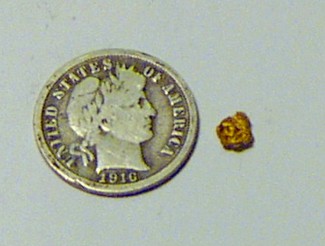 |
|
|
2.1
grain nugget found with the MXT detector |
| The final gold tally was just a hair over 4 Penney weight. It
was all small, the largest nugget weighing in at 9 grains. With the rain, detecting and
dredge pack in and out, I only ended up with a total of 15 hours of actual dredge time
over the whole 9 days. Next year my goal is to get in 30 hours. If I would have put in
more time dredging, I’d have surely gotten more gold, but all in all, it was a great
trip. The new home made sluice box performed real nice and did a great job holding onto
the fine gold. The lower level of the box did not plug up, and the sluice was a big
improvement on my box from previous years – I definitely got a lot more fines. I made
some new friends, visited with some old ones I hadn’t seen in a while, got a little
gold, saw some impressive nuggets, got some ideas for future prospecting trips. What more
can you ask for (other than getting more gold!)? I know I’ll be back in Sierra City
again next August, and hopefully the rain will stay away. Maybe if I get enough time in
the water dredging next year, I'll top half an ounce. |
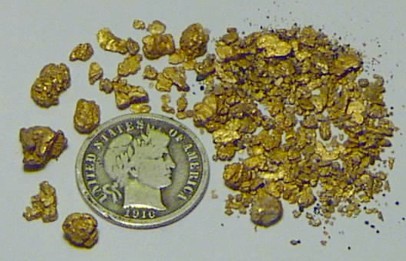 |
|
Final
Results - 4.1 dwt. Gold Recovered |
| While I was In Sierra City, I met a
prospector who had been working in that area during the summer months for many years. The
previous year he had found a crevice that yielded some nice little nuggets. He wanted to
follow it, but large boulder hung precariously on top of it. His son, who is also a
recreational prospector, assisted him to winch off the boulder, and a couple more that
were behind it. The crevice was out right out in the middle of the river, though the water
at that point was too shallow to dredge. The crevice turned out to be nearly 10 feet
long, and over a foot deep. When they cleaned it out, they were rewarded with almost 6
ounces of gold, including two nuggets of about 1.5 ounces each (one was just above an
ounce and a half and the other was 28 dwt.). The two nuggets in this photo came from that
crevice and are 8 dwt and 28 dwt in size. |
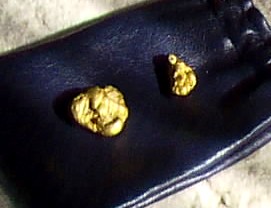 |
|
Yuba
River Gold, unfortunately these are not mine |
| The same prospector also had
this specimen which he did not find, but purchased. It is a crystallized gold specimen
from the Red Ledge Mine near Washington in Nevada County, California. The Red Ledge Mine
is famous for beautiful gold specimens of this type. |
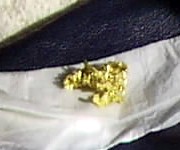 |
|
Crystaline
gold from the Red Ledge Mine |
|
| The North Fork of the Yuba River
is a well known gold bearing river and has been heavily dredged, especially in the area
both above and below Downieville. It runs for miles through the Sierra Nevada range. Where
I am working it has been little worked in the last 10 years as the claim is pretty much
surrounded by private property, and permission to trespass is required. Here is how
the river looks toward the upper end in the vicinity of Sierra City. This spot is actually
a well known local swimming hole for the kids - but there are nice nuggets in the bedrock
and among the boulders in the background. |
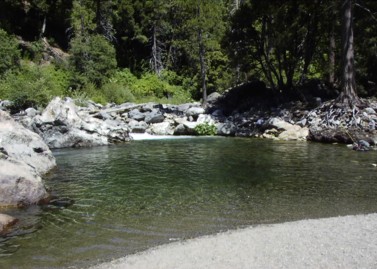 |
|
|
North
Fork, Yuba River - gold country |
|
| The second week I was there, I did a little detecting along
the river at some exposed bedrock while the water was too muddy to dredge. Here is part of
the place I worked, looking for gold in cracks and crevices in the bedrock. Although this
site has been pounded pretty hard, I did find a 2.1 grain gold nugget. A lot of folks have
found gold at this site over the years. |
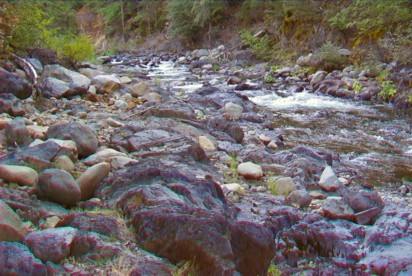 |
|
|
|
Exposed
Bedrock along the river - detecting site |
|
| The color on this shot came out really bad. It was shot in the
morning in the shadows. It shows though, that the bedrock has deep cracks and crevices
that can hold nice gold. This one has already been well worked, but you can see how this
type of opening could catch gold. It can be tough to negotiate even a small coil around
these spots, but it can really be worth it. |
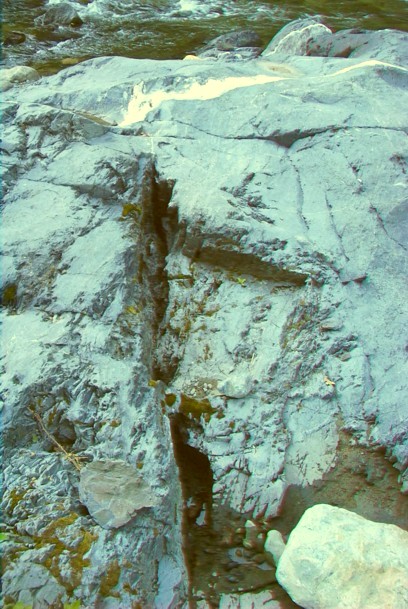 |
|
|
Bedrock
Crevice - Previously worked |
|
| Thanks for joining me
on this virtual prospecting trip to Sierra City! - Chris Ralph |

|
|
All Copyrights retained by Chris Ralph, do not copy or reprint without permission
|












